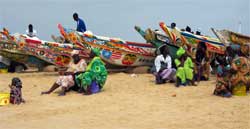 NARRAGANSETT, R.I. – November 22, 2011 – The West African nation of Senegal is facing a serious problem with food security, in part due to a decline in its fisheries. So the Senegalese government and the U.S. Agency for International Development have turned to the University of Rhode Island’s Coastal Resources Center for answers.
NARRAGANSETT, R.I. – November 22, 2011 – The West African nation of Senegal is facing a serious problem with food security, in part due to a decline in its fisheries. So the Senegalese government and the U.S. Agency for International Development have turned to the University of Rhode Island’s Coastal Resources Center for answers.
The Center, based at the Graduate School of Oceanography, has worked with numerous developing nations on coastal management and sustainable fisheries initiatives for three decades, but this is its first project in Senegal.
“Many of the fisheries in Senegal are severely overfished, with too many fishermen chasing too few fish,” said Brian Crawford, director of the Center’s international programs. “To prevent overfishing, they need to make improvements in the way they govern the resource and move toward better co-management approaches where fishermen are more engaged in the decision making process.”
Two of the Senegal program’s managers visited URI for the first time last month to discuss the status of their work and meet with URI experts who will be providing assistance.
“The Senegalese depend on the protein they get from eating fish, but fish landings have fallen by 20 percent, which has surely impacted the protein intake of the people,” said Chris Mathews, the team leader in Senegal. “There is too much effort being put into fishing, the power of their boats is increasing, they are using heavier gear, and more people are moving to the coast because agriculture is in decline from desertification.”
According to Mathews, who has worked on fisheries management issues in 35 countries during his long career, climate change is another key factor affecting the fisheries in Senegal.
“Climate change can have many of the same effects on fish populations as excessive fishing effort can,” he said. “If temperatures rise, fish production may change and the fish may end up moving elsewhere.”
A primary objective of the project is to develop strategies and policies that the Senegal government can implement to make their fisheries more sustainable and to adapt to climate change.
“One of our goals is to test and apply new technologies and new fisheries management approaches,” said Khady Sane, a native of Senegal and the deputy team leader on the project. “We’re even looking at the possibility of certifying the fishery through the Marine Stewardship Council.”
One of the first steps is to conduct a stock assessment of several important fish species and then identify potential management strategies that can improve the fishery and the livelihoods of the fishermen. Based on consultations with fishermen, scientists, government leaders and other stakeholders, the fisheries that will be the focus of the project will be sardinella and shad, which are important food fish for local people, as well as shrimp and grouper, which are high value species for export.
Through a participatory process, the URI team will develop management plans for each fish stock that includes protection of critical habitats and the identification of national and community scale actions for adapting to the effects of climate change.
Funded by an $11.5 million grant from the U.S. Agency for International Development, the project will include collaborations with numerous local partner organizations, including the World Wide Fund for Nature, a local university, and several community and fisherman’s organizations.
In Rhode Island, the project is being led by James Tobey at the Coastal Resources Center and Kathleen Castro at the URI Fisheries Center. In addition, many URI faculty and researchers with expertise in fisheries, climate change, economics, and other disciplines will provide training and guidance. Senegalese students and fisheries managers will also come to Rhode Island for workshops and other educational opportunities.
“We’re taking the experience and expertise from the URI community and sharing it with others around the world,” said Crawford. “We’re thinking about fisheries on a global scale.”

